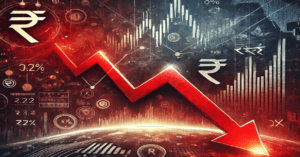Zerodha CEO Nithin Kamath on Market Crash: ‘30% Drop in Trading Volumes Highlights Shallow Indian Markets’
Indian stock markets saw a sharp decline in February, with the Sensex dropping over 4,000 points and ₹40 lakh crore wiped off market capitalization. The Nifty 50 marked its longest losing streak since 1996. Zerodha CEO Nithin Kamath highlighted a 30% drop in trading volumes, citing the true-to-market circular and limited market depth. He warned that STT revenue could fall to ₹40,000 crore, half of the government’s estimate. Foreign investor selling, driven by Trump’s tariff uncertainties, further pressured markets.
The Sensex lost 1,414 points this week, erasing ₹9 lakh crore in investor wealth. Analysts suggest a potential rebound in 4-6 weeks. Jefferies’ Chris Wood sees the correction as technical rather than a macroeconomic crisis.

Zerodha CEO Nithin Kamath on Market Crash: ‘30% Drop in Trading Volumes Highlights Shallow Indian Markets’
Indian stock markets witnessed a sharp and prolonged decline in February, with the Sensex plummeting over 4,000 points, reflecting a 5% drop for the month. This steep fall resulted in a massive ₹40 lakh crore erosion in market capitalization for BSE-listed companies. The Nifty 50 also suffered significant losses, marking its fifth consecutive month of decline—the longest losing streak since its inception in 1996. The sustained downturn has raised investor concerns about the overall stability of the Indian market.
Zerodha CEO Nithin Kamath addressed the market turmoil on social media platform X, stating that markets are undergoing a correction and could decline further, just as they previously surged to record highs. He highlighted a significant drop in trading activity, revealing that brokerage firms are witnessing a 30% decline in volumes. He attributed this slowdown to the impact of the true-to-market circular and noted that Zerodha is experiencing degrowth for the first time in its 15-year history. Kamath also pointed out that market participation remains concentrated among just 1 to 2 crore Indian investors, emphasizing the shallow nature of the Indian stock market.
Furthermore, he cautioned that if the downturn continues, the government’s projected revenue from the Securities Transaction Tax (STT) for FY25/26 could be slashed by half, dropping to ₹40,000 crore instead of the estimated ₹80,000 crore.
The market decline has been driven by aggressive foreign investor selling, largely fueled by uncertainties surrounding Trump’s proposed tariffs. This week alone, the Sensex lost 1,414 points (nearly 2%), erasing approximately ₹9 lakh crore in investor wealth. Meanwhile, the Nifty’s five-month losing streak has become its most prolonged decline in points since its inception.
Despite the ongoing slump, some analysts believe a reversal could be imminent. Market advisory firm Merisis suggested that the downturn may mark the final phase of capitulation, potentially paving the way for a strong counter-trend rally in the next 4-6 weeks. Similarly, Jefferies’ Global Equity Strategist Chris Wood stated that the correction appears to be primarily technical rather than driven by fundamental macroeconomic issues. In the GREED & Fear newsletter, he explained that the sell-off reflects multiple compression rather than major structural distress.
At the close of trading on Friday, the Sensex had fallen 1.9%, settling at 73,198.10 points from its previous close of 74,612.43, while the Nifty 50 dropped 1.86% to 22,124.70. The IT, tech, auto, and telecom sectors bore the brunt of the losses. Analysts linked the market downturn to global factors, including a sharp drop in US markets and renewed fears of trade wars after comments from former US President Donald Trump on tariffs.
Vaibhav Vidwani, a research analyst at Bonanza, noted that these concerns triggered the sell-off, deepening the decline in Indian equities. He highlighted that the combination of global economic uncertainty, weak domestic sentiment, and heavy foreign investor outflows contributed to the sharp downturn. Vidwani also pointed out that sectors such as IT, tech, auto, and telecom were particularly affected, with stocks hitting new lows as investor confidence continued to wane amid ongoing market volatility.
Check out TimesWordle.com for all the latest news
You must be logged in to post a comment.